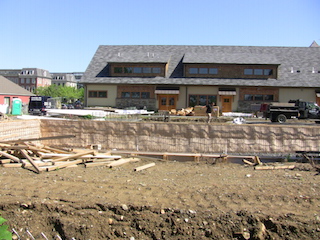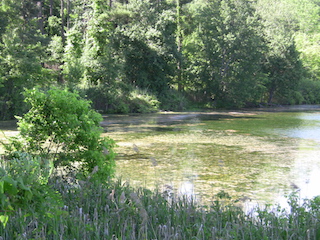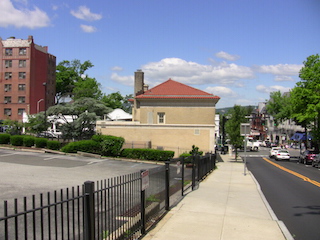 Since the closure of Citibank and its metered parking lot, which the Village of Tarrytown oversaw, local businesses in and around the corner of Main Street and Broadway have felt not only a decline of “walk in” business, they have also reported their profits down, in some cases as much as 20%, as a result of less available parking.
Since the closure of Citibank and its metered parking lot, which the Village of Tarrytown oversaw, local businesses in and around the corner of Main Street and Broadway have felt not only a decline of “walk in” business, they have also reported their profits down, in some cases as much as 20%, as a result of less available parking.
River Journal asked Tarrytown’s Village Administrator, Michael Blau, about the closure of the Citibank parking lot along with a number of questions about the Village.
His comments are in italics:
Photo: The loss of parking on Neperan Road has hurt busineses on Broadway and Main Street
1. Has the Village been in contact with or had meetings with Citibank regarding the parking lot on Neperan Road and the possibility of it being reopened?
There have not been discussions since the Village started the eminent domain process. Citibank has made it clear that they are not willing to execute a long term agreement for the use of a portion of the parking lot for municipal parking purposes.
2. With regard to a former Village law or code requiring restaurants to provide an actual number of parking spaces for their patrons, when was that provision rescinded and who initiated that?
The law that you are referring to relates to off-street parking requirements in the Restricted Retail Zoning District, which is basically the downtown commercial district. The amendment that you are referring to doesn’t relate strictly to restaurants, but to all possible uses in the Restricted Retail Zoning District. The Village has not changed the parking requirements, but what has changed is the ability to pay into what had been known as a Jitney Fund. Prior to the amendment, applicants before the Planning Board and Zoning Board of Appeals could pay into the Jitney Fund for 5 parking spaces, provided the PB or ZBA agreed to such a payment. The problem was that the Village was no longer operating a jitney. The law was amended to allow for payment into a Parking Fund for up to 15 required parking spaces. The Village may then use those funds for parking purposes, including the creation of additional parking. Once again, such payment can only occur if the PB or ZBA agree.
3. Can you let us know how much an annual parking permit costs for resident and non-resident for the train station lot?
A resident annual parking permit is $385.00 and a non-resident permit is $1,200. A resident permit enables a permit holder to park in any Village parking lot (not just the commuter parking lots) without putting money in the meter. The non-resident parking permit is only valid in certain commuter parking lots.
How much does an annual permit cost for the various lots within the Village, i.e., McKeel, Broadway at Elizabeth St., etc.?
No additional cost. As noted above, the Village only has one resident parking permit and permit holders can park in any metered parking lot.
Lastly, what is the total combined $ revenue that parking lots and street meters bring into the Village of Tarrytown annually?
For the category known as parking lots, which includes meters in parking lots and all parking permits issued, the revenue received for fiscal year 2015-2016 (ending on May 31, 2016) was $901,820.30. In the category of Street Parking, which are all parking meters on the street, the revenue received was $697,331.58.
4. What action is the Village taking with regard to controlling the growth of plant and algae blooms in the Tarrytown Lakes? What monies (specific dollar amount) have been set aside for that? Does the Village still pay a consulting firm regarding the issue at the Lakes, and if so, how much annually, and what do they do and how often?
 The Village works with a firm called Lake Savers on various algae growth control programs at the Tarrytown Lakes. The Village is implementing, through Lake Savers, a much more aggressive program to prevent algae blooms. It started last fall with what was called Upland Filtration, which were filtration controls on the major stream leading into the upper lake from the Crest area. The sediment is filtered and the water that continues on comes in contact with what they call a sock which has biological materials to prevent algae blooms. It is continuing this year with an increase in the filtration of sediment and nutrients at the base of the inlet leading into the upper lake, the filtration of some storm drains on Neperan Road that feed into the upper lake, and on-going biological treatment of the lake to control algae blooms. The cost, beyond what has been done in the past, is $11,380.
The Village works with a firm called Lake Savers on various algae growth control programs at the Tarrytown Lakes. The Village is implementing, through Lake Savers, a much more aggressive program to prevent algae blooms. It started last fall with what was called Upland Filtration, which were filtration controls on the major stream leading into the upper lake from the Crest area. The sediment is filtered and the water that continues on comes in contact with what they call a sock which has biological materials to prevent algae blooms. It is continuing this year with an increase in the filtration of sediment and nutrients at the base of the inlet leading into the upper lake, the filtration of some storm drains on Neperan Road that feed into the upper lake, and on-going biological treatment of the lake to control algae blooms. The cost, beyond what has been done in the past, is $11,380.
5. What is the current status of the new fitness center near the Senior Center? Who is managing it? Who can use it? How much does it cost? What are its hours of operation?
The Village is in the process of finalizing an agreement with a company called Salus to operate the fitness center. The new building has not been turned over to the Village so we cannot, at this point, operate a fitness center. We are in discussions with Joe Cotter to turn over the Recreation Building even though the pool is still under construction. The fitness center will be operated on weekdays from 5 am to 10 pm and on weekends from 7 am to 8 pm. The center will only be open to residents of Tarrytown. Fees vary from a low of $150/year for a senior citizen to $600/year for a family membership.
6.With regard to the pool, is the 4th of July still the anticipated opening date? If not, what is the new date?

We do not have an actual date for the opening of the pool. When the Village actually knows when the pool will be completed and has received all of the operational approvals from the Westchester County Health Department, we will then advertise for lifeguards. Depending upon whether we can find lifeguards will control the Village’s ability to open the pool. We could not hire lifeguards because we did not know when the pool would actually be available to the Village.
7. What is the intended use for the vacant Village Hall site on Wildey Street? What are the timelines for its use?
National RE/sources is constructing 12 units of affordable housing on that site. A building permit was issued on May 11, 2016 and they must complete the work in 18 months.
8. What infrastructure or other large projects is the Village undertaking this year from June on?
I am working on the Capital Budget for Fiscal Year 2016-2017 at the present time and until it is approved, I cannot answer this question.






